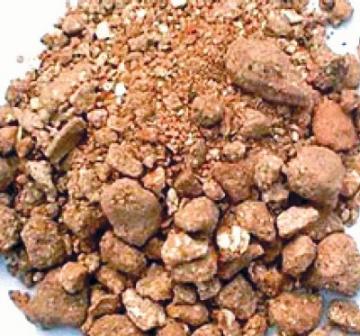
Groundnut meal (Arachis hypogaea)
Local names: Hindi: Moomphly Marathi: Bhuemug
Gujarati: Sing Tamil: Kadalai
Groundnut meal is an important source of protein for livestock feeding in India. Three types of oil cakes are available in India, namely ghani pressed, expeller pressed and solvent extracted cake.
Nutritive value
The content of oil is variable according to the process of extraction of oil. It is 10-12% in ghani pressed, 6-8% in expeller pressed and 0.5-0.7% in the solvent extracted cake. The protein content is variable from 40-50% and TDN 75-85%. The groundnut cake may be decorticated or undecorticated. In undecorticated groundnut cake the fibre content is very high. It is deficient in lysine, methionine, cystine, tryptophan and also low in calcium, carotene and vitamin D.
Deleterious factors
Groundnut cake is fed to the cattle, buffalo, sheep, goats, poultry and swine. It has been reported that both a growth factor and an antitrypsin factor occur in groundnut meal. The latter has antiplasmin activity and so shortens bleeding time, it is destroyed by heating. Feeding more than 25% of the diet with groundnut meal leads to laxative action, which limits its use for lactating cows, for which it otherwise forms an excellent and acceptable protein source. The cake is liable to contain a toxic factor which is shown to be a metabolite of the fungus Aspergillus flavus and is named aflatoxin. This is now known to be a mixture of four compounds designated as Aflatoxin B , G , B and G of which B is the most toxic. There are considerable species differences in the susceptibility to these toxins. Young animals are more susceptible than adult animals of the same species. There are several reports of death in calves below six months of age when fed on contaminated groundnut meal. Older cattle are more resistant but cases of death in cattle, loss of appetite and reduced milk yield in cows have been reported. A metabolite of aflatoxin known as aflatoxin M has been shown to be present in the milk of cows fed on toxic meals. Aflatoxins are relatively stable to heat.
